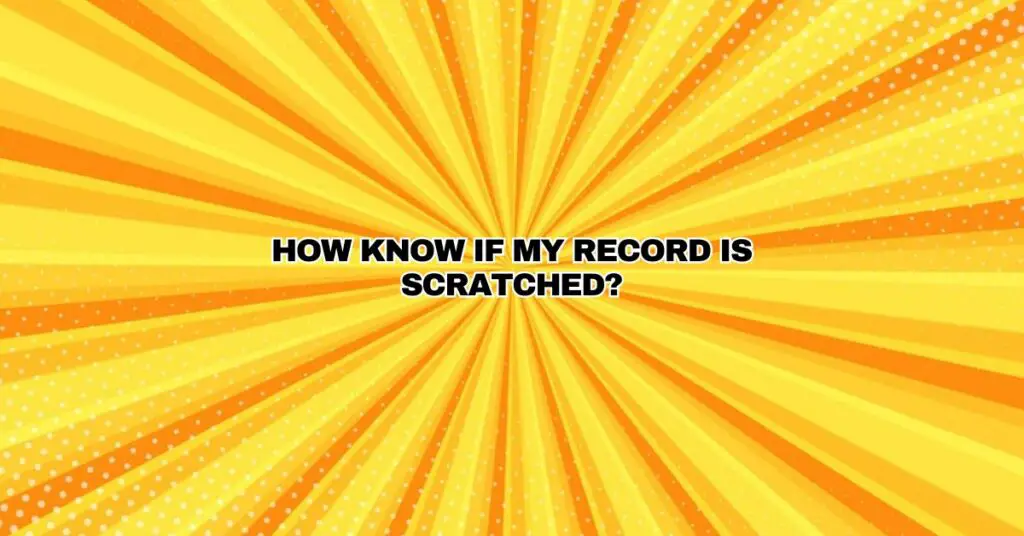Vinyl records, while cherished for their warm analog sound and nostalgic appeal, are susceptible to wear and tear, including scratches, which can affect the listening experience. Scratches on records can result in audible pops and clicks and even tracking issues if they are severe. In this comprehensive article, we’ll discuss how to identify if your record is scratched, provide insights into the types of scratches, and offer tips on minimizing and handling scratched records.
Signs of a Scratched Record:
- Audible Pops and Clicks: One of the most common signs of a scratched record is the presence of audible pops and clicks during playback. These noise artifacts occur when the stylus encounters imperfections in the groove caused by scratches.
- Repetitive Noise Patterns: Scratches often create consistent noise patterns. If you notice that the pops or clicks repeat at regular intervals, it’s a strong indicator of a scratch on the record.
- Hiss or Crackling: In addition to pops and clicks, you may hear a hiss or crackling noise when playing a scratched record. This can be particularly noticeable during quieter passages or in the run-in and run-out grooves.
- Skips or Jumps: Severe scratches or deep gouges on a record can cause the stylus to skip or jump, disrupting the continuity of the music. If your record consistently skips at the same spot, inspect it for visible damage.
- Visual Inspection: Sometimes, scratches are visible on the surface of the record. While not all scratches are immediately apparent, inspect your records under good lighting to identify any visible imperfections.
Types of Scratches:
- Superficial Scratches: These are light surface scratches that often result from mishandling, dust, or dirt. They may cause minimal audio distortion and are sometimes referred to as “paper scuffs.”
- Hairline Scratches: Hairline scratches are tiny and shallow, and they might not be easily visible to the naked eye. They can cause minor pops and clicks but are generally less problematic.
- Deep Scratches: Deep scratches are more severe and typically result in noticeable pops, clicks, and potentially skips. These can significantly impact the listening experience.
Handling Scratched Records:
If you have identified scratches on your records, consider these tips for handling and minimizing the impact of the damage:
- Cleaning: Clean your records regularly to remove dust and debris. A clean record is less likely to exacerbate existing scratches.
- Proper Storage: Store your records in protective sleeves or jackets to prevent additional scratches from handling and friction.
- Use a Good Turntable: A high-quality turntable with an adjustable tonearm and counterweight can minimize the risk of tracking errors and further scratching.
- Adjust Tracking Force: Ensure that your turntable’s tracking force is correctly set according to the manufacturer’s recommendations. Too much tracking force can exacerbate scratches.
- Replacement Stylus: If you have a high-end turntable, consider using a replaceable stylus. A worn stylus can cause more damage to records.
- Audiophile Vinyl Care: Audiophile-grade accessories, such as anti-static brushes and cleaning solutions, can help maintain your records in better condition.
- Playback Considerations: Consider playing heavily scratched records with a stylus specifically designed for worn or damaged records. Some specialized styli can track damaged grooves more effectively.
Record Restoration and Repair:
If you have valuable records with deep or severe scratches, professional record restoration services may offer solutions. These services can repair and recondition damaged records, restoring them to a playable condition. However, such services are often expensive and may not fully eliminate all audio artifacts.
In conclusion, knowing if your record is scratched is essential for preserving your vinyl collection and ensuring an enjoyable listening experience. Scratches can manifest as pops, clicks, hisses, or skips during playback. It’s important to handle your records with care, clean them regularly, and store them properly to prevent unnecessary damage. If you encounter heavily scratched records, consider seeking professional restoration services for valuable or rare albums.


